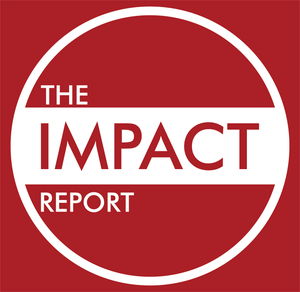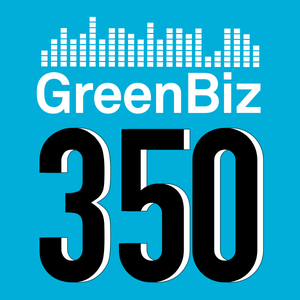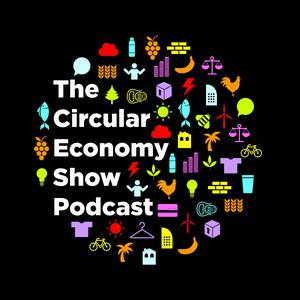
The Impact Report
Bard MBA in Sustainability
Stories from the front lines of business and sustainability innovation.
- 38 minutes 17 seconds#810 Lennox Omondi on Sustainable Innovation for Menstrual Health: From Myanmar Activism to Kenyan Social Enterprise
In this compelling episode, we speak with Ray Oo, a Myanmar refugee and climate activist currently pursuing his MBA in Sustainability, and Lennox Omondi, founder and CEO of Ecobana Limited in Kenya. Their conversation explores how sustainable innovation can address critical social challenges, focusing on Ecobana's development of biodegradable sanitary napkins made from banana fibers. The discussion weaves together themes of youth leadership, environmental sustainability, and social impact, as Lennox shares how he's tackling period poverty in Kenya while creating an environmentally conscious solution. Ray, who serves as Myanmar's representative on the Intergovernmental Negotiating Committee on Plastic Pollution, brings his unique perspective on climate activism and social change from the Global South, creating a rich dialogue about the intersection of sustainability, social justice, and entrepreneurship.
4 December 2024, 5:00 pm - 39 minutes 12 seconds#809 Ravi Mangla on Building Community Power: From Political Communication to Climate Action at Working Families Party
In this timely conversation, Working Families Party National Press Secretary Ravi Mangla and Bard MBA in Sustainability candidate Jackson Thompson join us to explore the intersection of political communication and climate action in the wake of the 2024 presidential election. Mangla shares insights on effective climate messaging for working communities, the importance of local organizing, and strategies for combating misinformation through authentic community engagement. The discussion delves into how progressive organizations can better connect with working-class voters, the power of fusion voting, and practical steps for civic engagement.
25 November 2024, 12:57 pm - 42 minutes 8 seconds#808 Nataki Williams on Transformative Leadership: Changing Decision-Making Habits & Embracing Diverse Voices
In this episode, Nataki Williams, CFO of The Guardian US, shares powerful insights on transforming corporate leadership through inclusive decision-making practices. Drawing from her experience moderating a panel on advancing women in leadership and her role as a sustainability ambassador, Williams discusses how changing the habits of how decisions are made can lead to more innovative, profitable, and sustainable businesses. She emphasizes that true diversity isn't just about having different voices at the table, but actually creating space to hear and incorporate those perspectives. Williams also shares her personal journey of overcoming age-related insecurities to become a leader who champions collaborative approaches, transparency, and hope as a discipline for creating meaningful change in business and society
18 November 2024, 8:45 pm - 28 minutes 17 seconds#807 Alexis Schwartz on Purpose-Driven Media: Breaking Down Paywalls and Amplifying Sustainability Stories
In this conversation, Alexis Schwartz, Head of Purpose Partnerships at The Guardian US, discusses how quality journalism can drive social impact and sustainability forward. She explains The Guardian's unique funding model that keeps journalism accessible by eliminating paywalls, which she argues breed inequity. Schwartz explores "the hush" - a recent phenomenon where brands have pulled back from publicly discussing DEI and sustainability initiatives due to fear of backlash and economic uncertainty. Through examples of The Guardian's partnerships with organizations like Doctors Without Borders and Bloomberg Philanthropies, she illustrates how media can effectively humanize sustainability and social justice stories. Schwartz emphasizes the importance of trusted media environments in combating misinformation and shares hope in seeing communities come together to address climate challenges.
15 November 2024, 5:08 pm - 25 minutes 26 seconds#806 Francis Janes on Equitable Banking: Transforming Finance Through Moral Leadership
In this conversation, Francis Janes, Industry Relations Director at Beneficial State Foundation, explores how the financial services industry can drive meaningful change through diversity, equity, and inclusion. Drawing from Citibank's research on closing racial wealth gaps and his experience bridging grassroots organizations with banking institutions, he explains how banks must move beyond traditional models to actively engage with historically marginalized communities. Janes emphasizes the industry's responsibility to repair historical harms like redlining, advocating for a proactive approach where financial institutions enter communities to listen, build partnerships, and develop long-term economic solutions. Through personal insights and professional experience, he paints a vision of banking that prioritizes humanity and inclusion, while sharing hope in the next generation's capacity to drive systemic change.
14 November 2024, 10:50 pm - 36 minutes 28 seconds#805 Kelly Beck on Radical Philanthropy: Building Trust, Moving Resources, and Getting Out of the Way
In this conversation with Kelly Beck, CEO of Greenlight Energy Group and founder of The Accomplis Collective, we explore the transformative journey from "recovering white feminist" to radical philanthropist. Kelly shares how she built a unique model for moving money equitably - without extraction or traditional philanthropic barriers - that has directed over $10 million to Black and Indigenous communities. Through personal stories, from driving water barrels to the Navajo Nation to challenging corporate sustainability practices, Kelly illuminates the critical difference between holding power and being in service. She advocates for a shift from individual success to collective action, emphasizing that true sustainability and social justice require us to build authentic relationships, center community needs, and sometimes simply "get out of the way" to let others lead.
13 November 2024, 8:47 pm - 42 minutes 29 seconds#804 Steven Lichtin on Renewable Energy: Building Community Partnerships for Clean Power
In this episode of the Impact Report, current Bard MBA student Milo Keller speaks with Steven Lichtin, CEO of Advantage Renewables, about the evolving landscape of renewable energy development. Lichtin, a member of Bard's inaugural MBA cohort, shares his journey from Wall Street trading to renewable energy, discussing how the industry has transformed since 2010. The conversation explores critical challenges facing renewable energy projects today, particularly interconnection bottlenecks and community engagement. Lichtin emphasizes the importance of being a "good neighbor" through transparent communication and local presence, while also highlighting how policy, from FERC regulations to state-level initiatives, shapes the industry's growth. The discussion offers valuable insights into both the technical and human elements of scaling renewable energy infrastructure, including the critical balance between project development and community partnership.
31 October 2024, 3:18 pm - 47 minutes 20 seconds#803 Brett Davis on Waste Prevention: Transforming Mardi Gras for a Sustainable Future
In this episode of The Impact Report, Bard MBA in Sustainability candidate Tricia Travis interviews Brett Davis, founding partner of the nonprofit Grounds Crew. They discuss the environmental challenges of New Orleans' Mardi Gras celebration, including the 2.6 million pounds of litter generated annually. Davis explains Grounds Crew's initiatives to make the festivities more sustainable, such as the Sustainable Throw Catalog and recycling programs. The conversation explores the economic and cultural complexities of changing Mardi Gras traditions, community engagement strategies, and signs of progress like one parade krewe banning plastic beads for 2025. Travis, who recently joined Grounds Crew, shares her perspective on the organization's educational outreach and the positive response from youth. Host Renay Loper joins for a follow-up discussion, delving deeper into the cultural significance of Mardi Gras and the hopeful signs for a more sustainable future in New Orleans.
17 October 2024, 3:27 pm - 46 minutes 12 seconds#802 Jennifer Louie on Catalytic Capital: Accelerating Circular Economy Solutions
In this episode, Jennifer Louie, Managing Director at Closed Loop Partners, discusses her work in catalytic capital and circular economy investing with current Bard MBA student Hector Aguirre. She explains their approach to investing in resource recovery and circular input business models, emphasizing measurable impact and financial additionality. Jennifer shares insights on their due diligence process, the challenges of competing with virgin materials, and the role of policy in accelerating circular economy adoption. She also discusses balancing impact and financial returns in catalytic investments and offers advice for those entering the field of sustainable finance and circular economy.
2 October 2024, 4:13 pm - 43 minutes 22 seconds#801 Libby Zemaitis on Climate Resilience: Connecting Communities and Driving Equitable Solutions
In this episode, Bard Alum Cate Byrnes sits down with Libby Zemaitis from the Center for Climate and Energy Solutions (C2ES) about her work on climate resilience and social justice. Libby discusses the importance of inclusive community engagement in climate planning, strategies to address green gentrification, and the role of nature-based solutions in building resilience. She shares insights from C2ES's Climate Resilient Communities Accelerator program and highlights the value of public-private partnerships in advancing local climate initiatives. Libby also reflects on how her multidisciplinary background from Bard's environmental policy and MBA programs informs her approach to connecting diverse stakeholders in resilience efforts. This conversation offers valuable perspectives on creating equitable and effective climate adaptation strategies at the community level.
18 September 2024, 9:16 pm - 54 minutes 23 seconds#705 Karl Wienhold on Sustainable Coffee Practices: Bridging Research and Fair Trade
In this episode of The Impact Report, host Renay engages in a compelling conversation with recent Bard MBA graduate Antonio Castillo and researcher Karl Wienhold. Together, they discuss the critical issues smallholder coffee farmers face in the global coffee trade. Antonio and Karl share their extensive experience and research on power imbalances, colonial legacies, and the poverty cycles that trap farmers who produce the majority of the world's coffee.
IN THE EPISODE:
The episode sheds light on Karl’s findings related to economic structures that perpetuate injustice and stresses the need for solidarity and collective bargaining among farmers. Antonio reflects on his field research in El Salvador and the potential of direct trade and ethical consumerism in bringing equitable change. They leave the listeners with a clear understanding of the complex coffee value chain and practical actions consumers can take to support justice for coffee farmers.
Bard’s Graduate Programs in Sustainability cultivate leaders who break through existing systems, innovating solutions to critical social, environmental and economic challenges. 2023 marks the 20th anniversary of the first graduating class from M.S. in Environmental Policy degree at Bard CEP and the 10th graduating class from the Bard MBA in Sustainability program. The 2023 graduating MS EP, MS CSP, MEd and MBA classes will bring the Bard GPS alumni community to over 500!
18 June 2024, 6:27 pm - More Episodes? Get the App
Your feedback is valuable to us. Should you encounter any bugs, glitches, lack of functionality or other problems, please email us on [email protected] or join Moon.FM Telegram Group where you can talk directly to the dev team who are happy to answer any queries.
 GreenBiz 350
GreenBiz 350
 The Circular Economy Show Podcast
The Circular Economy Show Podcast